CQ WEEKLY – COVER STORY
Sept. 17, 2011 – 3:09 p.m.
The Deregulated Campaign
By Eliza Newlin Carney, CQ Staff
When comedian Stephen Colbert won the Federal Election Commission’s approval in June to run his own so-called super political action committee, he lost no time soliciting money for it.
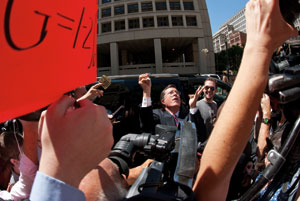
|
||
|
“Cash over here,” quipped Colbert as he waded into a crowd on the sidewalk outside the FEC’s downtown Washington office on the day of the ruling. Having warmed up his fans with a “knock-knock” joke about unlimited corporate and union contributions, Colbert grabbed fistfuls of bills and waved a credit-card reader. He offered to sign the card receipts himself and pretended to pocket some foreign money.
His sidewalk audience laughed, but the Comedy Central satirist was making a serious point. Colbert’s super PAC, which has since sponsored ads in Iowa spoofing the state of campaign financing and GOP Texas Gov.
Such PACs earned the “super” label because they live by lax rules that make it easy to raise and spend big money. Unlike traditional PACs, which are subject to stringent disclosure rules and limits on the size and source of contributions, super PACs may take large, unrestricted donations from any source, and use them to benefit any candidate or cause, as long as they operate at arm’s length from the campaign itself. In theory, they’re supposed to fully disclose their donations — but it doesn’t always turn out that way.
Almost 150 such PACs have sprung up in the months since the Supreme Court handed down its landmark Citizens United v. Federal Election Commission decision early last year. That ruling threw out the longtime ban on direct election-related independent expenditure by corporations and unions as a violation of the First Amendment, freeing up vast new wells of money and ushering in super PACs as the perfect reservoirs.
They’ve turned American elections into a rules-free zone. The fallout began during the 2010 midterm election, which featured a new generation of cash-flush groups, most of them friendly to the GOP.
In 2012, the impact of Citizens United will hit campaigns full force. All but a few of the restrictions that for decades had curbed political money are gone. Unprecedented sums are expected to flow through non-party outside groups, trade associations, nonprofits and particularly super PACs.
And some of those may push candidates to the sidelines, trumping their messages and campaign strategies.
The upshot will be an election with fewer controls, more spending and greater secrecy than any in recent memory. In theory, the Supreme Court rolled back restrictions only on independent campaign spending that’s fully disclosed. But in practice, reform advocates warn, the ruling has created new opportunities to keep money secret and break down the firewall between candidates and the supposedly independent super PACs that back them.
Out of Balance
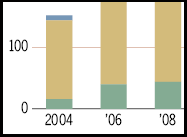
|
||
|
America’s modern campaign finance laws, born in the wake of the Nixon-era Watergate scandal, have never been models of stability, thanks in part to soaring campaign costs and to constant legal and enforcement challenges. By now, the pattern is familiar: Attempts to control big money seem to work for a while, until creative operatives find a way around the rules or the Supreme Court finds them wanting, prompting Congress to tinker still further.
The Deregulated Campaign
It’s a cycle that reflects the tension, inevitable when reining in political activity, between cherished American values: the First Amendment on one hand and the reformist commitment to transparency and accountability on the other. But in recent years, the balance has tilted in favor of free speech and deregulation. A more conservative Supreme Court, combined with lax enforcement of both tax and election laws, explains the shift.
Some applaud the rules shake-up, arguing that more money means more free speech and unfettered political participation.
“I just think it’s a great thing that any outside group is able to comment freely now about candidates in the elections,” says David Keating, executive director of the Club for Growth, an anti-tax group positioned to spend heavily in 2012.
Others warn that the combination of big money and unprecedented secrecy spells trouble ahead for democracy.
“I think what we’ve entered is essentially a lawless environment,” declares former Sen. Russ Feingold, a leading champion of campaign finance restrictions. The Wisconsin Democrat now heads Progressives United, a PAC that aims to reverse the Citizens United ruling.
“I think enormous signs of corruption will emerge from what’s being done to raise money in 2012,” Feingold adds. “And I think it will lead to real demand for reform.”
The new rules offer neither Republicans nor Democrats a clear advantage. Republicans, to be sure, were the first to seize the opportunities presented by Citizens United. GOP-friendly super PACs and non-party organizations outspent liberal and labor groups last year by $190.5 million to $98.9 million, according to the nonpartisan Center for Responsive Politics, a 2-to-1 advantage.
But Democrats have now jumped in to test the limits of the newly relaxed law. Having once assailed moneyed interests and secretive outside groups, Democrats have reversed course, embracing big donors and collecting cash for a network of little-regulated allied organizations. President Obama has also pivoted toward large donors, many on Wall Street.
The result could give Democrats a political edge on some fronts while giving Republicans the advantage on others. In the presidential contest, Democrats may win the money chase, thanks to Obama’s incumbency and his formidable fundraising prowess. In the House and Senate contests, Republicans may enjoy a critical boost from their wealthier corporate allies.
Both parties are in uncharted territory, and they have discovered that raising political money is becoming more complicated — and riskier — than ever. Some candidates have discovered that super PACs can be a mixed blessing, drawing controversy, setting off internal squabbling and running ads that conflict with the candidate’s carefully crafted campaign message.
For better or worse, political players on both sides of the aisle will shatter their previous spending records in 2012. If current trends continue, total spending will top $7 billion, up from $5.3 billion in 2008. Obama alone may raise $1 billion. And newly freed outside groups, from the pro-GOP American Crossroads to the pro-Obama Priorities USA, are pulling in six-figure corporate and union checks that once were illegal.
To some observers, the ramped-up scale and scope of political spending make 2012 look a lot like 1972 — the year that suitcases stuffed with cash ushered in the Watergate scandal. All the ingredients are the same, says political scientist Anthony J. Corrado: the massive expenditures, the unreported money, the corporate contributions.
“In 1972, there was concern about secret slush funds that were used to finance activities,” said Corrado, a professor of government at Colby College in Waterville, Maine. “Those slush funds will pale in comparison to the undisclosed money that will flow in 2012.”
The Deregulated Campaign
The Watergate-era analogy is imperfect, Corrado acknowledges. The Citizens United ruling did free outside groups to spend unrestricted money, but only if they remain independent from and do not coordinate with parties or candidates.
Candidates still face strict limits on the size and source of contributions; individual checks are still capped at $2,500, for example, and may not come from corporate or union treasuries. The 2002 “soft money” ban that Feingold wrote with Republican Sen.
The Death of Public Financing
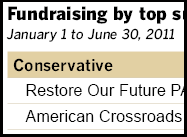
|
||
|
Still, the post-Watergate reforms of the 1970s have toppled one by one. The presidential public-financing system has all but died, thanks largely to inflation and dwindling taxpayer support. Obama helped kill public financing when he became the first major party White House candidate to reject Treasury money in both the primary and the general election.
In June, the Supreme Court helped put the nail in the coffin of public financing of elections when it struck a key provision of Arizona’s public-funding law, which had offered additional money to candidates facing well-funded opponents. At the federal level, 2012 will almost certainly mark the first time that neither party nominee accepts public financing in either the primary or the general election.
“The presidential public-financing system will only be used, if it’s used at all, by candidates who don’t have a prayer to win,” says Michael J. Malbin, executive director of the nonpartisan Campaign Finance Institute.
Activists who favor stricter regulation put part of the blame for weakening the election laws on the FEC, which is well-known for partisan stalemates. It was an FEC ruling that ushered in the soft-money era of the 1990s, by allowing candidates and federal officials to raise unlimited, unregulated donations for the political parties.
McCain and Feingold did turn off the soft-money spigot with the 2002 Bipartisan Campaign Reform Act. But some attribute the growing clout of non-party, outside groups to that law, better known as McCain-Feingold. Barred from giving soft money to the political parties, liberal donors such as financier George Soros pouredmillions into Democrat-allied groups such as America Coming Together in 2004.
“By outlawing soft money to political parties, the law stimulated the outside groups,” says Jan Witold Baran, a partner with Washington-area law firm Wiley Rein and a leading GOP election-law expert. “Up until McCain-Feingold, we had a relatively confined system, where the money was predominantly raised and spent by candidates and political parties. And now we have a very different system.”
But the real game changer was Citizens United. That ruling struck down McCain-Feingold’s ban on soft-money “issue” ads by groups that picture or name a candidate on the eve of an election. Most important, it freed corporations and unions to spend directly on campaigns, saying the ban violated the First Amendment. Together with another 2010 court ruling, SpeechNow.org v. FEC, which freed independent groups to spend unrestricted amounts of money to expressly attack or support candidates, the Citizens United ruling ushered in two types of powerful new campaign fundraising vehicles: super PACs and big-money nonprofits.
Concern about corrupting campaigns — the traditional justification for regulating election money in the first place — does not apply to these groups, the court said, because they operate independently from candidates and parties and fully disclose their activities. Indeed, the court decisively rejected a challenge to some McCain-Feingold disclosure requirements.
The Supreme Court’s vision of a fully disclosed and independent campaign spending system, however, bears little resemblance to real-world politics. That’s in part because of lax enforcement at both the FEC and the IRS, legal experts say. The FEC has defined coordination so loosely, reform advocates argue, that super PACs are turning out to be not very independent after all. Increasingly, candidates are indirectly helping staff and raising money for supposedly independent super PACs. The FEC’s disclosure regulations are also riddled with loopholes, argue reformers who have sued the commission in a bid to strengthen those rules.
The Deregulated Campaign
The IRS, in the meantime, has turned a blind eye to political activity by nonprofits such as 501(c)4 groups that in theory must devote themselves principally to social welfare but that in practice are starting to look like thinly disguised campaign committees. And under IRS rules, nonprofits may keep their funding sources under wraps. They may make, and some reportedly are making, contributions to super PACs.
That means super PACs, which must theoretically report their activities to the FEC, are collecting some donations that never see the light of day. And politically active nonprofits are not disclosing their donors at all. To be sure, politically active nonprofits such as America Coming Together spent big money on campaign-style ads in 2004. But in 2004, that organization and similar groups set themselves up as fully disclosed political organizations known as 527 groups, which must stick to issues and avoid direct election messages.
Post-Citizens United, political organizers’ strategy of choice is very different: Pair a transparent super PAC with an affiliated nonprofit that operates in secret. For last year’s midterms, independent campaign expenditures by super PACs, politically active nonprofits and other outside groups soared to $204 million, nearly a fourfold increase over the $43.6 million they spent in 2008, according to the FEC.
“There’s greater flexibility for the outside groups to raise virtually any sums from any source, with no requirement to disclose their sources,” says Sheila Krumholz, executive director of the Center for Responsive Politics. “In this way, the organizations can have their cake and eat it, too, and they can pick and choose when and where to disclose the sources of their funding.”
Both the pro-GOP American Crossroads and the Democrat-friendly Priorities USA Action, for example, are super PACs that explicitly run campaign ads and report to the FEC. But both groups also operate nonprofit arms that enjoy tax-free status because, in theory, they principally promote the social welfare. The real purpose of these nonprofits, however, is not social welfare but influencing elections, argued the nonpartisan Campaign Legal Center and the watchdog group Democracy 21 in a July petition to the IRS. The petition called on the IRS to rewrite its regulations to better enforce the law.
A few super PACs are even collecting contributions directly from their nonprofit affiliates, the Center for Responsive Politics reported in July. Such contributions cannot be traced back to donors, given the absence of disclosure rules for nonprofits. If that trend continues, even super PACs will increasingly operate under the radar. Already, as independent spending goes up, public disclosure is going down. In 2010, groups not disclosing any information about their funders spent $135.6 million, almost double the $68.9 million that outside groups spent in 2006, according to a Public Citizen analysis.
The growing secrecy that shrouds political money is at odds with the disclosure ideal articulated in Citizens United. Disclosure is essential, Justice
“We’ve had many years of expecting disclosure, assuming disclosure,” says Trevor Potter, a former FEC chairman who heads the political law practice at Caplin & Drysdale in Washington. “And I think it’s going to be a real shock to people that we don’t have that this year.”
‘Dancing With the Devil’
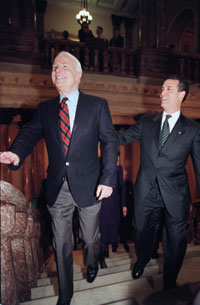
|
||
|
Having tested the post-Citizen United waters in 2010, political players are gearing up to fully exploit the wide-open money field in 2012. Every day, activists register new super PACs with names such as Working Families for Hawaii and Stop Public Unions Now. The AFL-CIO, which saw many of its candidates swamped by conservative outside money in 2010, has set up a super PAC, signaling a determination to play by the new rules and a strategy shift toward year-round advocacy.
The big players will be two competing networks of groups launched by party loyalists on both sides. These include the American Crossroads super PAC and its allied advocacy nonprofit, Crossroads Grassroots Policy Strategies, masterminded by GOP operatives Karl Rove and Ed Gillespie. The U.S. Chamber of Commerce, which after Crossroads was the second-largest non-party spender in 2010, will also spend aggressively.
Obama and congressional Democrats decried such groups in 2010, seeking to make secret corporate money a campaign issue, but they have now set up their own quasi-party apparatus. Former White House and Democratic Party officials have launched multiple independent groups — one to help Obama, another to back Senate candidates, another to spend in House races and yet another to do opposition research for Democrats across the board.
The Deregulated Campaign
Some liberals denounce this turnabout, complaining that Democrats, too, will now collect large donations that escape the radar. Feingold told activists at a Netroots Nation rally in June that his colleagues are “dancing with the devil.”
“Accepting undisclosed soft money is wrong, and it’s also a game we can’t win,” he said in an interview. He warned that Democrats who abandon low-dollar donors in favor of large contributions risk losing grass-roots support and are making “a very serious political mistake.”
Some liberal organizers have set up disclosure-only outside groups, refusing to establish nonprofit affiliates that operate outside the reporting rules. The House Majority PAC, for example, a super PAC that backs House Democratic candidates, does not operate a nonprofit arm — in part, according to organizers, because some of its backers object to making secret donations.
“House Democrats believe very strongly that all donations ought to be disclosed and all expenditures should be disclosed,” said Rep.
But the overwhelming consensus among leading Democratic organizers these days is that voters paid little attention to their attacks on secret money last year. Even Alixandria Lapp, who heads the House Majority PAC, maintains that Democrats as a whole are better off playing by the new rules than fighting them.
Republican players “have seemingly unlimited pockets” and overwhelmed many close midterm contests in the final weeks, Lapp says. She adds: “You can’t go into political battle with your political opponent with one hand tied behind your back.”
Democrats running non-party groups have a lot of catching up to do. Conservative super PACs collected $17.6 million in the first half of this year, according to the Center for Responsive Politics, more than twice the $7.6 million that liberal super PACs brought in.
Crossroads organizers alone say they’ll spend $240 million overall — double the group’s original $120 million target — and already have spent tens of millions on ads that exhort voters to take away Obama’s “blank check” and that target House and Senate candidates in battleground states. Priorities USA Action, one of the two leading Democratic outside groups focused on the White House race, has responded with six-figure ad buys of its own. But its organizers concede that Republicans will probably outraise them.
“I don’t think anyone doubts that the Republicans will have more corporate support than the Democratic side,” says Bill Burton, a former White House spokesman who is a senior strategist for Priorities USA, a nonprofit advocacy group, and Priorities USA Action, a super PAC.
Unions Cut Back
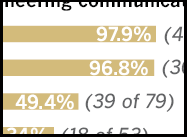
|
||
|
Republicans say labor unions have long outspent them and will do so again. But in this election, that looks unlikely. According to a Center for Responsive Politics analysis, labor unions have lost membership, are under assault at the state level and gave only $4.75 million to federal candidates in the first three months of this year — a sharp drop from the $8.44 million they had doled out at the same point in the previous cycle.
“One of the things that we’re trying to do — and I think we are effectively doing — is countering the tremendous power of the president’s bully pulpit in a major policy showdown,” said American Crossroads President Steven Law.
The Deregulated Campaign
GOP-friendly outside groups such as Crossroads may end up making more of an impact in congressional races than in the presidential contest.
Obama, too, is playing by the new big-money rules. He discouraged liberal outside groups from spending unregulated money to help him in 2004, but he has done nothing to stop such efforts this time around.
Obama’s campaign still won’t accept donations from lobbyists or PACs, and its officials touted the 552,462 individual donors who helped boost the president’s second-quarter fundraising haul to $46.3 million.
But large donors are clearly central to Obama’s financial strategy this time around. He has tapped an elite cadre of donors from Hollywood, Wall Street and Silicon Valley to act as “bundlers” and round up as much as $500,000 each. Campaign officials have released the names of 244 bundlers who’ve collected $50,000 each for Obama’s re-election, much of it from the financial sector.
At the same time, GOP presidential fundraising started slowly this year, in part because many big donors were waiting for the primary field to settle. Officials at the Republican National Committee say they have made steady progress winning back large donors who disappeared when the controversial Michael Steele was chairman.
The RNC outraised the Democratic National Committee by more than $2.5 million in August. But the $43.4 million that the RNC collected through July 31 of this year still lagged far behind the DNC’s $64.7 million.
“We’ve come a long way,” said RNC Chairman Reince Priebus. “But obviously, with a billion-dollar president, we’ve got a long way to go.”
Perry’s entry into the Republican presidential primary may help wake up big GOP donors. Perry has collected more than $100 million since he became governor a decade ago, and he has been helped by wealthy business executives both inside and outside Texas who bundle six-figure contributions on his behalf. Perry also will attract small donors among both social conservatives and tea party Republicans, his supporters say.
“This is a guy who sort of hits all the right buttons with Republicans,” says Bob Schuman, who heads the super PAC Americans for
Perry’s arrival coincides with the super PAC bonanza on the GOP side. Every one of the top Republican presidential candidates — from Rep.
As super PACs proliferate, some are becoming magnets for controversy and bad press. No fewer than seven such PACs reportedly have rallied behind Perry, and some have traded barbs over which enjoy his blessing.
Several presidential super PACs have close ties to the candidates they back, raising questions about how independent they really are. Priorities USA Action, which is backing Obama, is headed by two former White House aides: Burton and former senior adviser Sean Sweeney. A Romney-friendly super PAC, which has pulled in $12 million, has hired one of Romney’s top fundraisers.
Called “Restore Our Future,” the pro-Romney super PAC has been the target of complaints over three $1 million donations that came through obscure companies that seemed to do little or no other business. Democracy 21 and the Campaign Legal Center have asked the Justice Department and the FEC to investigate whether the companies in question “illegally masked the actual donors of the contributions.” The Romney campaign has responded that the PAC is independent of the campaign, while the PAC organizers have stated that they are complying with the appropriate laws.
The Deregulated Campaign
Senate Democrats, for their part, contend that big, well-funded GOP groups may actually help Democratic candidates by dragging Republicans into costly primary contests. Internal battles between tea party conservatives and more moderate Republicans may have kept the GOP from capturing the Senate in 2010, they argue, and the same dynamic may play out next year.
There are “a lot of Republican-on-Republican attacks by these outside groups,” noted one Democratic operative. “It’s going to be a huge advantage for us going into the general election.”
Indeed, well-funded outside groups can hurt candidates as much as they help them, political scientists say, making elections more volatile and unpredictable.
“If you’re a candidate, you think it’s very negative,” says D.C. lawyer Baran. “Because candidates like to control the message. They get upset when their message is distracted by somebody else’s message — even when somebody else is trying to help them. It can be counterproductive.”
It’s only a matter of time, some say, before the large amounts of undisclosed, unregulated money sloshing through campaigns usher in the next Watergate-style scandal.
“Two things you can bet on,” said John J. Pitney Jr., a professor of politics at Claremont McKenna College in Claremont, Calif. “One, there will be a scandal. Two, there will be proposals for change. But you don’t know what the scandal will be, and you don’t know what the proposals for change will be that follow the scandal.”
What’s Next?
Some still see the answer in public financing, for both presidential and congressional candidates. Reform advocates on Capitol Hill have introduced legislation both to overhaul the outdated presidential public financing system and to publicly fund House and Senate races. But such proposals lack political momentum, particularly now that the Supreme Court has ruled that part of Arizona’s public-financing law is unconstitutional.
More likely than new rules may be further deregulation, as party officials and candidates push for the same freedoms that outside groups enjoy. Given the makeup of the Supreme Court, the only new rules likely to withstand constitutional challenge may be disclosure regulations. The next big court fights will be over relaxing party and candidate restrictions, election-law experts predict, and public disclosure. “What comes next is a continued push to roll back campaign regulations, in particular greater calls to level the playing field between the parties and the interest groups,” Professor Corrado predicts.
In the meantime, political power and money will continue to shift away from established players and toward outsiders — be they party operatives, activists or comedians such as Colbert.
Before climbing into his private car to leave the FEC, Colbert couldn’t resist turning to ask the crowd one last time: “Is there any more cash before we go?” In an election turned on its head by the Supreme Court, more cash may be the one thing everyone can count on.
Eliza Newlin Carney is a Roll Call staff writer.
FOR FURTHER READING: Super PACs, CQ Weekly, p. 1174; American Crossroads, p. 455; Citizens United ruling, 2010 Almanac, p. 11-35; McCain-Feingold law (PL 107-155), 2002 Almanac, p. 14-7; Watergate overhaul (PL 93-433), 1974 Almanac, p. 611.